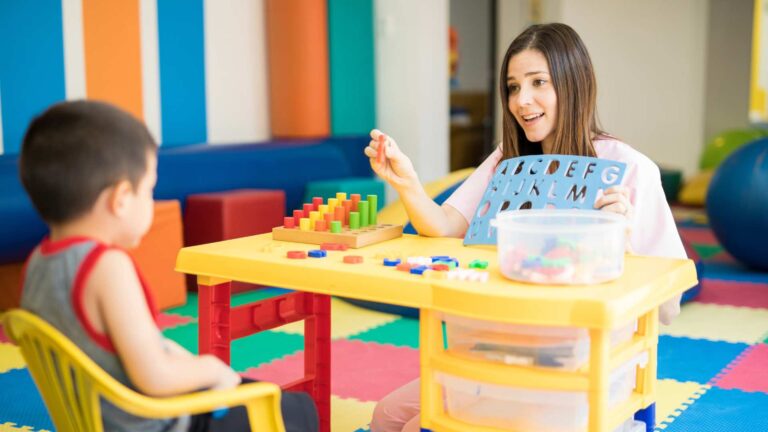How can we celebrate St. Patrick’s Day with sensory issues?
St. Patrick’s Day festivities in Austin, Dallas, and Houston are often a mix of Irish traditions, parades, music, dancing, and, of course, numerous green-themed parties. While these celebrations may be fun for many, those with sensory processing sensitivity may find them overwhelming or even frightening. So, how can we celebrate St. Patrick’s Day with sensory issues?
At Texas ABA Centers, we understand the various challenges faced by individuals with autism spectrum disorder (ASD), including sensory processing sensitivity, difficulties with emotional expression, social interactions, and repetitive behaviors. It is feasible to create a sensory-friendly St. Patrick’s Day through appropriate adaptations to address the needs of those with developmental disorders, transforming this holiday into an inclusive and fun event for all.
In this blog, you will learn seven strategies for preparing a sensory-friendly St. Patrick’s Day, with the goal of mitigating the stress our neurodiverse loved ones may experience during the festivities.
Why is St. Patrick’s Day Challenging for Individuals with Sensory Processing Sensitivity?
Individuals with developmental disorders, such as autism, often have heightened sensitivity to stimuli, including light and noise. These stimuli are frequently present during holidays like Christmas, New Year’s, Halloween, or St. Patrick’s Day. Communication difficulties, repetitive behaviors, social interaction issues, and sensory processing sensitivities, among others, characterize autism. These traits can pose additional challenges when these individuals encounter changes in routines or increased social demands, which commonly occur during holidays.
In order to celebrate a sensory-friendly St. Patrick’s Day, it is crucial to understand the challenges that individuals with autism may face.
- Difficulty adapting to new environments: Unfamiliar environments associated with St. Patrick’s Day celebrations can be overwhelming for individuals with autism. New environments can lead to increased behavioral episodes and heightened anxiety, making it challenging for them to adjust.
- Sensory sensitivities: Parade crowds, loud noises, people in costumes, and other usual holiday stimuli can cause distress for individuals with sensory processing issues.
- Understanding social expectations: Children and teenagers with autism might have trouble understanding the meaning of certain traditions or social cues related to holidays, leading to confusion and potentially resulting in meltdowns or problematic behaviors.
- Need for proactive support: Neurodiverse families need to be aware of these challenges and address them proactively to ensure a sensory-friendly St. Patrick’s Day celebration, providing a positive experience for their loved ones.
Preparing a Sensory-Friendly St. Patrick’s Day
1. Use Visual Aids:
Visual aids are especially beneficial for people with autism. These tools can include a visual schedule, which is a great support for celebrating a sensory-friendly St. Patrick’s Day. A visual schedule allows your loved one with autism to understand behavioral expectations for upcoming events while providing a clear and organized structure of the day, helping to reduce anxiety and feelings of uncertainty.
Creating visual aids and a specific schedule for St. Patrick’s Day can improve understanding of the celebration and what will happen during the day, thereby alleviating symptoms that could trigger problematic behaviors. For example, you can include images of children enjoying a parade, wearing green T-shirts, or tasting foods typical of the holiday. It is essential to take time to explain the visual schedule to your child and allow them to ask questions to familiarize themselves with the plan and express any concerns they may have so that you can address them appropriately.
2. Seek Professional ABA Support:
Applied Behavior Analysis, also known as ABA therapy, is a specialized approach that addresses some of the challenging characteristics of autism. With ABA therapy, individuals can acquire effective communication techniques, strategies for coping with stress and anxiety, social skills, and more. This preparation allows them to participate more fully in celebrations such as St. Patrick’s Day. Additionally, ABA professionals can collaborate with families to develop therapy plans tailored to an individual’s specific goals and needs, including particular support needed for engaging in celebrations.
3. Create New Traditions:
Identifying the challenges your loved one might face during the celebrations is essential to planning activities that engage them without compromising their well-being and comfort. Introducing new activities and traditions is critical to ensure a sensory-friendly St. Patrick’s Day and provide people with autism a sense of control and autonomy. For example, making crafts, cooking, coloring, and reading St. Patrick’s Day-themed books can be fun and relaxing activities for those with sensory sensitivities. In addition, you can incorporate hobbies that your child already enjoys, such as watching their favorite TV show, to add a familiar and comforting element to the new routine of the day.
4. Prepare for Potential Sensory Overload:
While these strategies aim to minimize the risk of sensory overload, it’s crucial to acknowledge that such an event may still occur. St. Patrick’s Day celebrations can be chaotic, potentially triggering anxiety in individuals with autism who have sensory processing sensitivity. Therefore, being prepared with a plan is essential to alleviate stress should an overload occur.
For instance, ensure you bring items that can help your loved one manage moments of distress, such as noise-canceling headphones, earplugs, and sensory toys. Also, identify a quiet place where they can take breaks if needed. It’s beneficial to find a less crowded spot and pack a sensory kit with calming objects. Additionally, stay informed about sensory-friendly solutions, especially if planning to attend a parade.
5. Unleash Your Creativity:
The internet, particularly Pinterest, can be your ally in creating a sensory-friendly St. Patrick’s Day celebration. Online, you’ll discover a vast array of St. Patrick’s Day-themed activities that are engaging and the entire family can enjoy. For instance, you could organize a scavenger hunt, construct leprechaun traps, bake shamrock cookies, and so much more! Allow your creativity to flourish and make this day an exceptional occasion.
6. Encourage Sensory Play:
Children with autism experiencing sensory processing sensitivity may benefit from sensory play. For instance, creating a sensory bucket filled with green-colored water, dough, or rice and hiding gold coins and toy clovers can be an engaging activity that offers a soothing effect through the introduction of new sensations. You can conduct this activity at home and involve the entire family, fostering social interactions. Moreover, bringing the sensory bin to other St. Patrick’s Day venues and events can function as a calming and entertaining tool for your loved one.
7. Involve Your Family in the Planning:
Having family members involved in planning a sensory-friendly St. Patrick’s Day can enhance inclusivity and provide a sense of control over the experience for everyone. During this process, you can ask each member, including your loved one with autism, to share their opinions on activities, contribute ideas, and collaborate on decorations and food selections.
Celebrate a Sensory-Friendly St. Patrick’s Day with Texas ABA Centers
Texas ABA Centers wish you a joyful St. Patrick’s Day! What better way to commemorate this day than by accessing the best autism care services? If your loved one encounters challenges during festive occasions, ABA therapy can be a game-changer! Feel free to call us at (877) 771-5725 or contact us online. At Texas ABA Centers, we’re not only eager to help you prepare and plan a sensory-friendly St. Patrick’s Day but also committed to enhancing the overall quality of life for your child and family.








